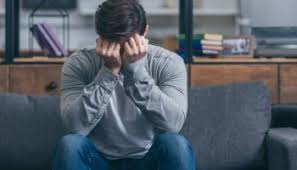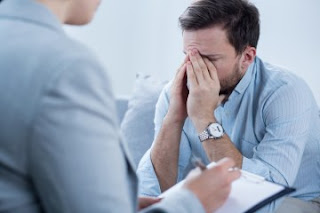I open my waiting room door to a mid-thirtyish man pacing back and forth in front of the couch. “Frank?” I ask.
He startles and turns to face me. “Oh, I’m so sorry. Did I frighten you? I didn’t mean to frighten you. I just can’t sit still. I’m so jittery. I just…”
I note that he’s afraid of having frightened me when he’s clearly the one who’s terrified. “It’s all right,” I interrupt. “Why don’t we go into my office and sit down.”
He sits, but perches at the edge of the chair, as though posed for flight.
“What has you so frightened?” I ask.
“My, my, mother,” he stammers. “I’m afraid she’s going to die. My father died a year ago. He was fine, came home from work, went upstairs and died. Doctors said something about his heart. I couldn’t understand it. My Mom started screaming and screaming. I guess I did too. It still all a blur. But now I’m worried about my Mom. They say she has something in her uterus. I’m afraid she’s going to die. I couldn’t make it if she died. I couldn’t make it,” he says starting to cry.
“What does she have in her uterus? Are her doctors concerned? Is she concerned?”
“She’s a wreck. Her doctors say it’s nothing, just something to watch. I don’t know, fibrosus?”
“Fibroids?” I ask.
“That’s it! Can that kill you?”
“I’m not a medical doctor, but my understanding is that fibroids aren’t usually a problem.”
“Are you sure?”
“Frank, do you think anyone can sufficiently reassure you?”
Still crying, he says, “I’ve always been this way. Everything scares me. Mom’s like that too. Dad was also kind of anxious. Only my sister isn’t. She’s the opposite. She’s in something like the Peace Corps. In India. My parents flipped out when she joined. But she was determined. And now she married an Indian guy so I guess she’s never coming home. I worry about her dying too, but it’s not as bad as with my Mom.”
“Can you tell me a little about your growing up, Frank. What was it like being a kid in your family?”
“It was great. I didn’t worry about anyone dying then.” Pause. “But I was always afraid. Hard not to be. My Mom worried about everything, about us being kidnapped, about us driving. I didn’t drive ‘til I was 20 or something. She’d take us to the doctor for the least little sniffle. Make us stay home from school.” Pause. “That was okay with me. I didn’t like school. I mean it wasn’t school I minded. I just didn’t like being away from home. I always felt scared being away from home. The other kids made fun of me, called me a Momma’s boy. I guess I was. Guess I still am.”
“Have you ever lived away from home?”
“I tried. Went away to college, but didn’t last a semester. I came home, got a degree in accounting. Dad was an accountant. But I’m an assistant accountant. I didn’t want all that responsibility. I didn’t want the work to kill me like it killed Dad. I work mostly from home, especially since Covid, and especially since my Dad died. I want to be around for my Mom. She’s my responsibility now that he’s gone.”
“Have you been in therapy before?”
“I may have gone awhile when I was a little kid. But not really, no, not since I’m grown.”
“How do you feel about being in therapy? And how do you feel being with me?”
“I guess I need it. I’d like to not be so scared all the time.” Pause. “And I like you. You’re nice. Sort of like my Mom, except not as nervous.” Pause. “Can you help me be less scared?”
“I certainly hope so. But I do want to say, Frank, that you may not always think I’m so nice. There are times therapy can be hard and painful. Like one of the things I suspect you and I are going to look at is your relationship with your mother.”
“Why? I have a great relationship with my mother.”
“Except it’s hard for you to have a life apart from her.”
“Are you going to take Mom away from me?” Frank asks, panic seeping into his voice.
“No, Frank. I don’t have the power to do that nor would I want to. But having part of your life be separate from your mother seems like something an adult child might want.”
“I guess.”
“You can always disagree with me, Frank. My saying something doesn’t make it so.”
“That’s not like my mother! She always wants me to think the same way as her.”
“Well, maybe that’s one thing we’ll get to look at together, how you feel about always needing to think like your Mom.”





















